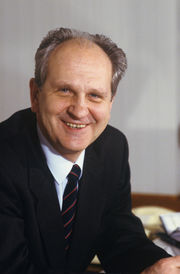Difference between revisions of "Boris Pugo"
(unstub) |
m (Text replacement - " also served as " to " was also ") |
||
| Line 25: | Line 25: | ||
'''Boris Karlovich Pugo''' was a Soviet Communist politician of Latvian origin. | '''Boris Karlovich Pugo''' was a Soviet Communist politician of Latvian origin. | ||
| − | Pugo was the first secretary of the [[Communist Party of Latvia|Communist Party of the Latvian SSR]] from April 14, 1984 to October 4, 1988. Pugo also | + | Pugo was the first secretary of the [[Communist Party of Latvia|Communist Party of the Latvian SSR]] from April 14, 1984 to October 4, 1988. Pugo was also chairman of the [[Control Commission of the Communist Party of the Soviet Union]] from 1988-1991. |
Between 1990 and 1991, he was the [[Russian Ministry of Internal Affairs|Minister of the Interior Affairs of the USSR]]. He was a member of the [[August Coup]] in 1991 and as the minister of interior firmly supported measures to suppress opposition to the coup. | Between 1990 and 1991, he was the [[Russian Ministry of Internal Affairs|Minister of the Interior Affairs of the USSR]]. He was a member of the [[August Coup]] in 1991 and as the minister of interior firmly supported measures to suppress opposition to the coup. | ||
Latest revision as of 19:06, 25 August 2022
 | |
| Born | 1937-02-19 Kalinin, Russian SFSR, Soviet Union |
| Died | 1991-08-22 (Age 54) Moscow, Russian SFSR, Soviet Union |
| Citizenship | Soviet |
| Alma mater | Riga Polytechnical |
| Party | Communist Party of the Soviet Union |
Boris Karlovich Pugo was a Soviet Communist politician of Latvian origin.
Pugo was the first secretary of the Communist Party of the Latvian SSR from April 14, 1984 to October 4, 1988. Pugo was also chairman of the Control Commission of the Communist Party of the Soviet Union from 1988-1991.
Between 1990 and 1991, he was the Minister of the Interior Affairs of the USSR. He was a member of the August Coup in 1991 and as the minister of interior firmly supported measures to suppress opposition to the coup.
Death
After the coup had failed, he supposedly committed suicide, anticipating arrest. He was contacted by the RSFSR prosecution for a meeting and he shot his wife and himself minutes after the phone call. It has been suggested that he committed suicide with a remarkable 3 shots to the head.[1]